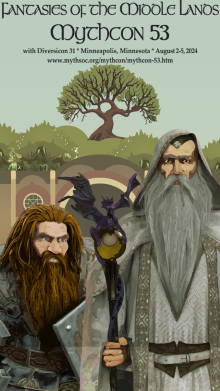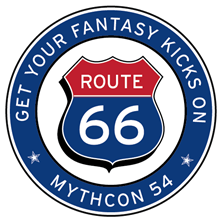Loading...
Location
Minneapolis, Minnesota
Document Type
Presentation
Event Website
https://www.mythsoc.org/mythcon/mythcon-53.htm
Start Date
2-8-2024 1:30 PM
End Date
2-8-2024 2:20 PM
Description
J.R.R. Tolkien’s beloved Dwarves evidence “middleness,” or a consistent state of being in flux or consistent change, as evidenced by their historical development, foreignness to other races, and displacement from their homes. The Dwarven race, from their first references in Tolkien’s works, are considered to be a race at odds with the other races of Ilúvatar. Tolkien’s Dwarves are initially seen as a politically neutral or an outright evil group, neither aligning themselves with followers of Manwë nor of Melkor. Additionally, they are described numerous times as more akin to the Orcish race than of the other Free Folk. While some have argued these earliest versions of Dwarves are a matter of narratorial perspective, it is telling that the Dwarves themselves remain on neither positive nor negative political terms with other races throughout the other books. Further, their creation by Aulë shows their timeliness as well. The Dwarves may be considered to occupy a middle position since they are not true children of Ilúvatar. Next, after beginning their lives in darkness, Dwarves continue to live in relative obscurity when compared to others. Occupying spaces between both darkness and light, their preference is for living amid the very earth of Arda. Finally, Dwarves are constantly shown to be displaced people; whereas, other races have defined homelands, Dwarves primarily live in exile. The entirety of The Hobbit shows how the loss of a true home bears on the Dwarven consciousness. Is there any hope for a recovery from this Dwarven “middleness?” For Tolkien, Gimli is the Dwarf par excellence. In his relationships with the other members of the Fellowship, through beginning to reconcile the adoptive children with the true children of Ilúvatar, Gimli provides an answer to the middleness of the Dwarven race.
Creative Commons License

This work is licensed under a Creative Commons Attribution-NonCommercial-No Derivative Works 4.0 International License.
Included in
The Middle People of Middle-earth: Dwarven Displacement and Reconciliation in Tolkien’s Legendarium
Minneapolis, Minnesota
J.R.R. Tolkien’s beloved Dwarves evidence “middleness,” or a consistent state of being in flux or consistent change, as evidenced by their historical development, foreignness to other races, and displacement from their homes. The Dwarven race, from their first references in Tolkien’s works, are considered to be a race at odds with the other races of Ilúvatar. Tolkien’s Dwarves are initially seen as a politically neutral or an outright evil group, neither aligning themselves with followers of Manwë nor of Melkor. Additionally, they are described numerous times as more akin to the Orcish race than of the other Free Folk. While some have argued these earliest versions of Dwarves are a matter of narratorial perspective, it is telling that the Dwarves themselves remain on neither positive nor negative political terms with other races throughout the other books. Further, their creation by Aulë shows their timeliness as well. The Dwarves may be considered to occupy a middle position since they are not true children of Ilúvatar. Next, after beginning their lives in darkness, Dwarves continue to live in relative obscurity when compared to others. Occupying spaces between both darkness and light, their preference is for living amid the very earth of Arda. Finally, Dwarves are constantly shown to be displaced people; whereas, other races have defined homelands, Dwarves primarily live in exile. The entirety of The Hobbit shows how the loss of a true home bears on the Dwarven consciousness. Is there any hope for a recovery from this Dwarven “middleness?” For Tolkien, Gimli is the Dwarf par excellence. In his relationships with the other members of the Fellowship, through beginning to reconcile the adoptive children with the true children of Ilúvatar, Gimli provides an answer to the middleness of the Dwarven race.
https://dc.swosu.edu/mythcon/mc53/schedule/11


